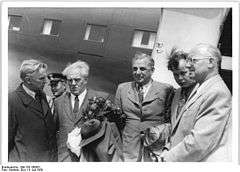Pyotr Pavlenko
| Pyotr Pavlenko | |
|---|---|
|
Pavlenko (right) with fellow Soviet writers in 1950. | |
| Born |
July 11, 1899 St Petersburg, Russia |
| Died |
June 16, 1951 (aged 51) Moscow, Soviet Union |
Pyotr Andreyevich Pavlenko (Russian: Пётр Андре́евич Павле́нко), (born July 11, 1899, in St. Petersburg; died June 16, 1951, in Moscow), was a Soviet writer, screenwriter and war correspondent. He became a member of the CPSU in 1920.
Biography
Early life
Pavlenko was born in St Petersburg where his father was an office worker. Pavlenko studied at the Baku Polytechnic in 1919/20. In 1920 he began political work in the Red Army and continued this work later in Transcaucasia.
Career
He was part of the Soviet trade delegation in Turkey from 1924 to 1927. Pavlenko began publishing his works in 1928. His first short stories and essays, among them the collections Asian Stories (1929) and Istanbul and Turkey (1930), dealt with the non-Soviet East.[1]
Pavlenko's travels in the Soviet East in the early 1930s[2] furnished him with material for reevaluating and overcoming the heritage of oriental romanticism, a literary manner characteristic of the Pereval (The Pass) group of writers, with which he was associated. His new approach was reflected in the novella The Desert (1931) and the book of essays Journey to Turkmenistan (1932). In the novel The Barricades (1932), which dealt with the Paris Commune of 1871, he attained the realistic technique he'd been working toward. Defense of the homeland is the central theme of the novel In the East (books 1–2, 1936–37; film title In the Far East, 1937, in collaboration with S. Radzinsky) and of the film script for Alexander Nevsky (1938, in collaboration with Sergei Eisenstein; State Prize of the USSR, 1941).[3] Pavlenko also wrote the film script for Yakov Sverdlov (1940; in collaboration with B. M. Levin).[1]
Pavlenko was a war correspondent during the Soviet-Finnish War of 1939–40 and World War 2. The novel Happiness (1947; State Prize of the USSR) was inspired by his experience during the restoration of the Crimea’s economy. The hero, the Communist Voropaev, is depicted comprehensively and in depth. In collaboration with Mikheil Chiaureli, Pavlenko wrote the scripts for the films The Vow (1946; State Prize of the USSR, 1947) and The Fall of Berlin (1949; State Prize of the USSR, 1950). He also wrote three books of essays, American Impressions (1949), Young Germany and Italian Impressions (both 1951). The novella Steppe Sunlight (1949) is clear and graphic in its language and well-defined in its aim. Pavlenko’s novel Toilers of the World (partly published in 1952) was unfinished.[1]
Later life
Pavlenko was a deputy to the third convocation of the Supreme Soviet of the USSR. He was awarded the Order of Lenin, two other orders, and several medals. He died in 1951 in Moscow and was buried in the Novodevichy Cemetery.[1]
Awards[4]
- USSR State Prize (4)
- Order of Lenin
- Order of the Red Banner of Labour
- Order of the Red Star
- Medal "For the Defence of Moscow"
- Medal "For the Defence of Stalingrad"
- Medal "For the Defence of the Caucasus"
- Medal "For the Capture of Budapest"
- Medal "For the Capture of Vienna"
Notes
English translations
- Red Planes Fly East, Routledge & Sons, 1938.
- Happiness, Foreign Languages Publishing House, Moscow, 1950.
- Steppe Sunlight, Foreign Languages Publishing House, Moscow, 1953.
- The Voice on the Way: Novelettes, Foreign Languages Publishing House, Moscow, 1954.
- The Lost Son, from Such a Simple Thing and Other Soviet Stories, Foreign Languages Publishing House, Moscow. from Archive.org
- Happiness, the novel summarized from SovLit.net
